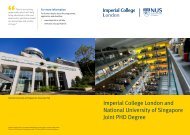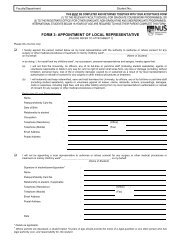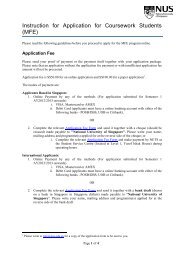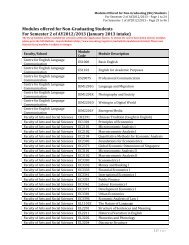engineering
engineering
engineering
You also want an ePaper? Increase the reach of your titles
YUMPU automatically turns print PDFs into web optimized ePapers that Google loves.
Part II: PROGRAMMES<br />
F Faculty of Engineering<br />
1. Faculty’s Commitment<br />
1.1 How we see ourselves<br />
An Engineering School advancing technology,<br />
influencing Asia and beyond.<br />
1.2 What we seek to do<br />
Nurture Engineer-Leaders with passion and boldness to<br />
solve complex challenges.<br />
1.3 Introduction<br />
The largest faculty in NUS, the Faculty of Engineering<br />
aims to nurture Engineer-Leaders with the ability to solve<br />
complex problems and to bring about a better world<br />
through innovation and technology. The Faculty is<br />
among the top 15 in Engineering and Technology in the<br />
Times Higher Education-QS World University Ranking<br />
2009. Besides being equipped with a strong foundation<br />
in <strong>engineering</strong> and scientific fundamentals, students will<br />
also be given opportunities to tailor their own learning<br />
experience involving elective modules, projects and<br />
independent study modules within the scope of their<br />
<strong>engineering</strong> major.<br />
Students can also participate in a host of enhancement<br />
programmes such as local and overseas industrial<br />
attachment, short-term internships, the<br />
technopreneurship programme, innovation programme,<br />
undergraduate research opportunities programme<br />
(UROP) and independent work programme. These<br />
enhancement programmes expose students to the many<br />
facets of industry and business in a global marketplace<br />
setting — from R&D, design, manufacturing, and<br />
intellectual property generation and protection, to<br />
starting a technology-based business.<br />
Engineering students can also choose a new learning<br />
pathway — the Design-Centric Curriculum. Launched in<br />
2009, this Curriculum provides a platform that brings<br />
together <strong>engineering</strong>, form, function, aesthetics, culture<br />
and lifestyle. Through the design process, students will<br />
learn to solve problems from multidisciplinary<br />
perspectives. Forging strong partnerships with the<br />
University’s School of Design and Environment, Faculty<br />
of Science and Yong Loo Lin School of Medicine, the<br />
DCC explores three initial themes: Future Transportation<br />
Systems, Engineering in Medicine; and Smart and<br />
Sustainable Cities.<br />
Students with exceptional potential as Engineer-Leaders<br />
of tomorrow may choose to enrol in the Global<br />
Engineering Programme (GEP) which enables students<br />
to receive a Bachelor of Engineering in the field of their<br />
choice after three years at NUS, supported by a<br />
scholarship. They will then go on to pursue a<br />
postgraduate degree at a top partner university.<br />
Graduates can continue with doctoral studies thereafter<br />
or enroll directly in a Ph.D. programme. NUS will also<br />
source funding from external agencies to help fund GEP<br />
students for their graduate studies overseas.<br />
…182…<br />
Degrees offered:<br />
• Bachelor of Engineering (Honours) [B.Eng. (Hons.)]<br />
• Bachelor of Technology (Honours) [B.Tech. (Hons.)]<br />
• Master of Engineering (M.Eng.)<br />
• Master of Science (M.Sc.)<br />
• Doctor of Philosophy (Ph.D.)<br />
More details can be found in sections 3 to 5.<br />
Choose your specialisations from:<br />
• Division of Bio<strong>engineering</strong><br />
• Department of Chemical & Biomolecular Engineering<br />
• Department of Civil Engineering<br />
• Department of Electrical & Computer Engineering<br />
• Engineering Science Programme<br />
• Division of Environmental Science & Engineering<br />
• Department of Industrial & Systems Engineering<br />
• Department of Materials Science & Engineering<br />
• Department of Mechanical Engineering<br />
For up to date information on the Faculty, please visit:<br />
http://www.eng.nus.edu.sg<br />
History<br />
Professional <strong>engineering</strong> education in Singapore had its<br />
humble beginnings at the University of Malaya campus<br />
in 1955. When the Department of Engineering was<br />
transferred to Kuala Lumpur in 1958, there was a hiatus<br />
in professional degree <strong>engineering</strong> courses in Singapore,<br />
and Singapore students went to Kuala Lumpur for their<br />
B. Eng. degree. Then in 1964, a School of Engineering<br />
was established in the campus of the Singapore<br />
Polytechnic to offer degree courses in Engineering, with<br />
the University of Singapore overseeing standards and<br />
awarding the B. Eng. degree.<br />
The first batch of 37 Engineering students under this<br />
scheme graduated in June 1968. In 1969, the School of<br />
Engineering in the Singapore Polytechnic was<br />
constituted as the Faculty of Engineering of the<br />
University of Singapore. However it remained in the<br />
Prince Edward Road campus of the polytechnic until the<br />
Kent Ridge campus was built and ready to receive it. The<br />
Faculty then comprised the Civil Engineering, Electrical<br />
Engineering and Mechanical Engineering departments.<br />
In 1972, the Department of Industrial & Systems<br />
Engineering was established. The undergraduate degree<br />
programme in Chemical Engineering which started in<br />
the Department of Chemistry in the Faculty of Science in<br />
1975 was transferred to the Faculty of Engineering in<br />
1979.<br />
The Faculty of Engineering within the National University<br />
of Singapore was reconstituted in August 1980 with the<br />
merger between the University of Singapore and<br />
Nanyang University. In response to the nation’s needs,<br />
an undergraduate degree programme in environmental<br />
<strong>engineering</strong> was initiated by the Department of<br />
Chemical Engineering, which subsequently changed its<br />
name to the Department of Chemical & Environmental<br />
Engineering in 1998. In 2003, the Faculty decided to<br />
consolidate and enhance the research and educational<br />
activities in environmental science and <strong>engineering</strong> in<br />
the Chemical & Environmental Engineering and Civil<br />
Engineering departments into a separate Division of<br />
Environmental Science & Engineering. In January 2004,<br />
the Chemical Engineering department became the<br />
Department of Chemical & Biomolecular Engineering,<br />
which gives due recognition to the strong biomolecular<br />
research and educational activities in the department







